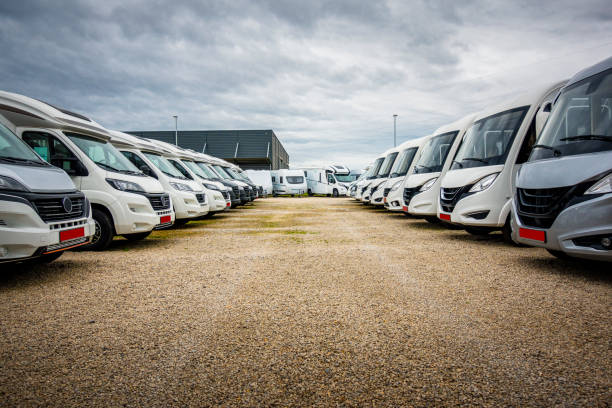It’s a decision nearly every new RV host wrestles with:
Do I rent out my personal RV—or should I buy one just for the rental business?
On paper, both options seem viable. Renting out the RV you already own sounds simple and low-cost. But putting your personal rig into the hands of strangers can feel… risky.
On the flip side, buying a separate RV for rental use is an investment—but it also creates boundaries, business write-offs, and more freedom to scale.
At RVM, we’ve worked with hundreds of owners on both sides of the fence. Some start by renting out their own rig and grow from there. Others invest in a dedicated rental fleet from day one. There’s no one-size-fits-all answer—but there is a right fit for your goals, lifestyle, and comfort level.
This guide will walk you through the pros, cons, and real-life examples of each path—so you can make the decision that’s best for you.
Table of Contents
- Why This Question Matters More Than You Think
- The Case for Renting Out Your Personal RV
- When It Makes Sense to Buy a Dedicated Rental Unit
- Emotional vs. Financial Ownership: The Hidden Tradeoffs
- Taxes, Write-Offs, and How the IRS Sees Each Option
- How Wear & Tear Really Plays Out (and How to Protect Against It)
- Scaling: Which Path Grows Faster?
- Case Study: How a Family of Four Turned One Rig Into a Three-Unit Fleet
- What RVM Recommends for First-Time Hosts
- Conclusion: Match the Model to Your Mindset
1. Why This Question Matters More Than You Think

The decision between personal-use and rental-only RVs sets the tone for your entire rental business.
It impacts how often you can use your RV, how you insure it, what taxes you’ll pay (or save), and how fast you can grow.
We’ve seen owners who treated it casually—just renting “a few weekends here and there”—and ended up with frustrated renters, personal travel delays, and surprise repairs. We’ve also seen people go all-in on rental-only units and build passive income with peace of mind.
The key? Start by knowing your goals.
2. The Case for Renting Out Your Personal RV
If you already own an RV and want to dip your toe into rentals, starting with your personal rig makes a lot of sense.
✅ Lower startup cost
✅ You know the layout, quirks, and maintenance history
✅ Great way to test if the rental lifestyle works for you
This is how many RVM owners start. One couple in Colorado Springs listed their personal Class C for a few weekends in the summer, just to cover their monthly payment. Within two months, they were booked out solid—and realized they had a real business on their hands.
The catch? You’ll need to plan your personal trips around the rental schedule and get comfortable with renters using your home-on-wheels.
3. When It Makes Sense to Buy a Dedicated Rental Unit
Buying an RV just for rental use gives you more control, more scale, and less emotional friction.
✅ You decide when it’s available
✅ No need to “de-personalize” before each rental
✅ Easier to grow into multiple units
Many seasoned hosts say it’s like flipping a switch—from hobbyist to business owner. One RVM client in Arizona started with a used travel trailer he never intended to use personally. Today, he owns six rentals and hasn’t missed a family camping trip in years—because his personal RV is off-limits to guests.
4. Emotional vs. Financial Ownership: The Hidden Tradeoffs

Let’s be honest—renting out something you love can feel strange. There’s the fear of damage, the wear on cushions, the fingerprints on the fridge.
That emotional attachment can create stress—and even tension with renters.
Buying a dedicated rental rig helps separate those feelings. You start thinking in ROI, not memories.
Still, for many, that emotional connection to their first RV is part of the charm. Just know which hat you want to wear: traveler or entrepreneur?
5. Taxes, Write-Offs, and How the IRS Sees Each Option
Renting out your personal RV part-time? You’ll likely fall into “mixed use” territory—meaning some expenses are deductible, and some are not.
A dedicated rental unit? That’s a clear-cut business asset. You may qualify for bonus depreciation, mileage write-offs, and full expense deductions.
Pro tip: Work with a tax pro who understands RV rentals. RVM can connect you with specialists who know the landscape.
6. How Wear & Tear Really Plays Out (and How to Protect Against It)
This is the #1 concern we hear from owners: “Won’t renters trash my RV?”
Honestly? Most renters take great care of the rigs—especially when systems are in place. That’s why RVM includes:
- Guest screening
- Security deposits
- Damage coverage
- Roadside assistance
- Maintenance tracking
Still, if it’s your personal rig, you’ll notice every little scratch. If it’s a rental-only unit, you’ll focus more on uptime and ROI.
7. Scaling: Which Path Grows Faster?
If your goal is passive income or a small fleet, buying rental-dedicated units usually leads to faster scaling.
You’re not juggling personal trips with bookings. You can optimize layouts for renters (not your family). And you’re more likely to treat it like a business from day one.
Many successful hosts start personal, prove the model, then add dedicated units to expand.
8. Case Study: How a Family of Four Turned One Rig Into a Three-Unit Fleet
Take the Masons from Nashville. In 2021, they rented out their personal bunkhouse travel trailer to cover loan payments.
By spring 2022, they'd earned enough profit to buy a second RV—this one strictly for guests. A third unit followed six months later.
Their secret? They used personal experience to refine the guest process, then built systems around it. Today, they camp with their original trailer and let the other two do the earning.
9. What RVM Recommends for First-Time Hosts

If you’re new to RV rentals and already own an RV, start with what you have. It’s a low-risk way to learn:
- How to prep and list
- What guests expect
- What bookings look like in your area
But if you’re ready to treat this like a business—or can’t stand the idea of strangers in your personal RV—start with a rental-dedicated unit. Used is fine. Simplicity is better.
Either way, RVM can help manage, market, and maintain your fleet so you’re never alone in the process.
10. Conclusion: Match the Model to Your Mindset
There’s no right or wrong way to start an RV rental business—but there is a smarter way to align with your lifestyle, income goals, and peace of mind.
If you love the idea of earning with the RV you already have—go for it. If you want to build a true business, consider keeping your personal rig personal and buying one just for rentals.
Whatever path you choose, RVM is here to help you make the most of it—safely, profitably, and with fewer headaches along the way.
Your RV. Your rules. We just make it work smarter.
— RVM Team

